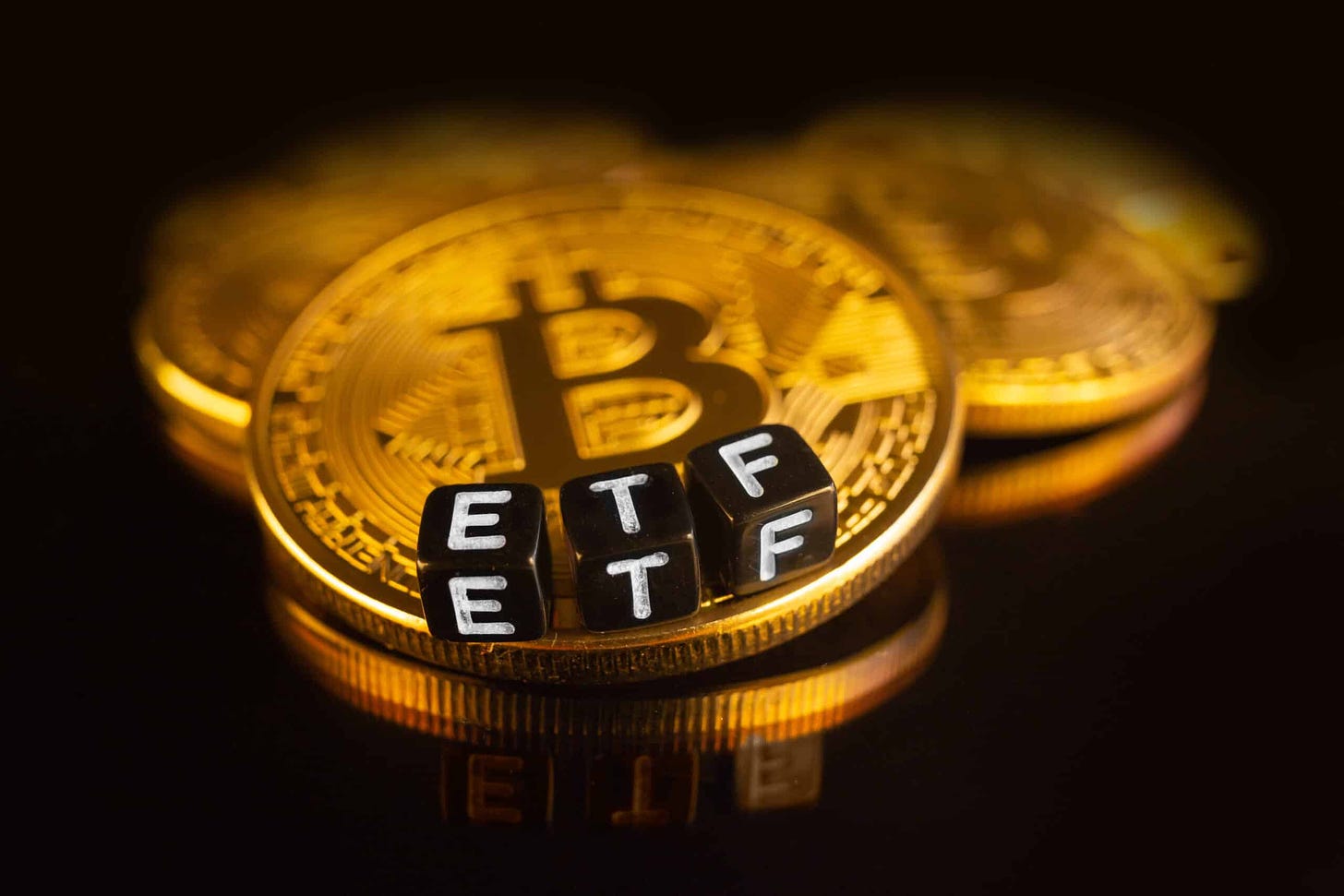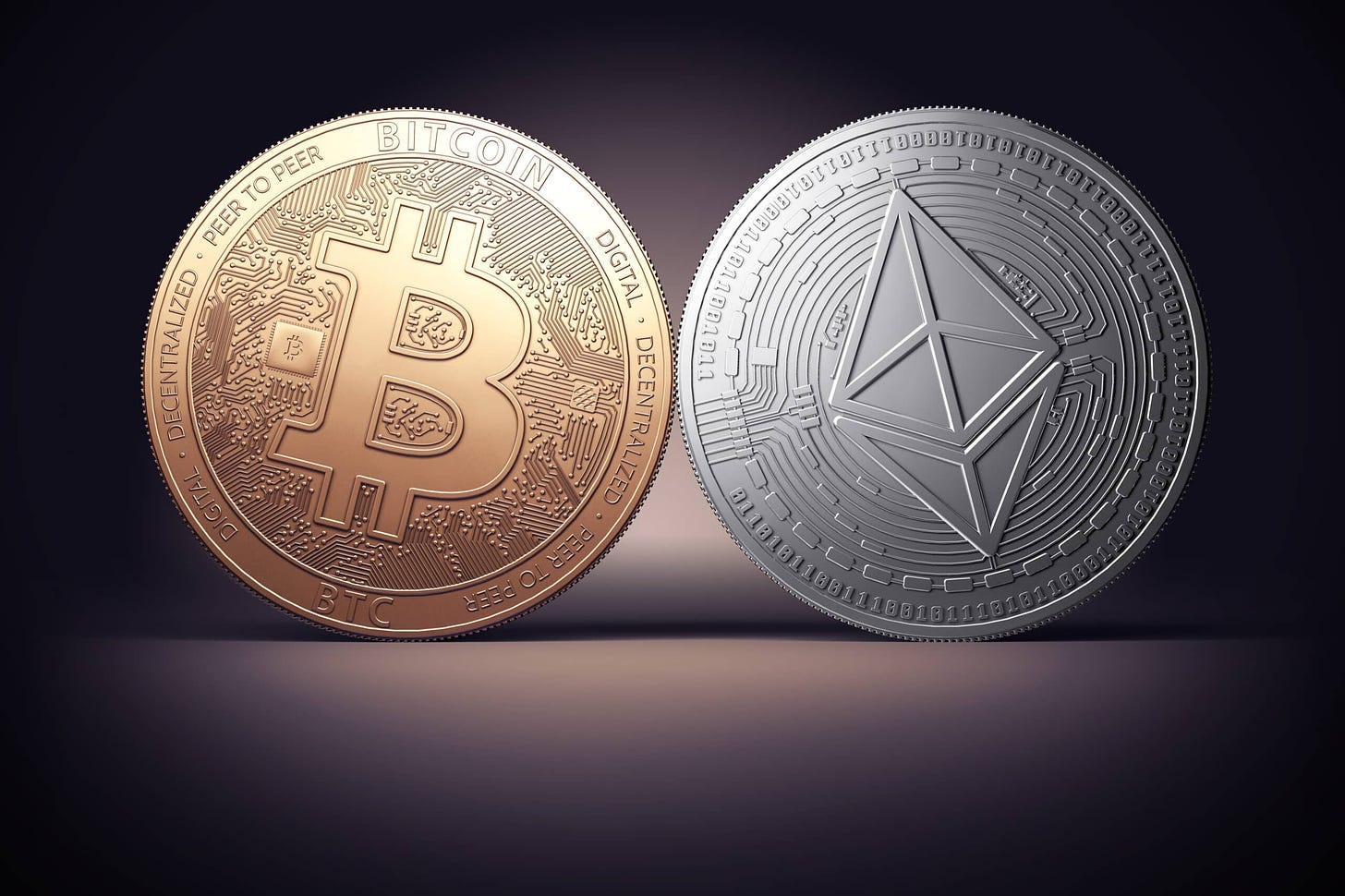🔍 What's the Buzz About Runes Protocol?
Weekly News Recap:🚨 Mango Markets trial ends in conviction, 🌏 Hong Kong launches BTC and ETH ETFs, 📜 New stablecoin bill introduced by U.S. Senators, 🤔 Senators question CFTC Chair's FTX ties.
You are reading the Unchained Weekly newsletter, where we cover all the major news in the crypto space, providing insights into the market's latest trends, regulatory shifts, and technological advancements. Stay informed with your no-hype resource for all things crypto.
If You Like Unchained: Refer us with a friend and earn a Premium subscription!
Tomorrow, the Runes Protocol on Bitcoin will go live.
This episode of Unchained features Charlie Spears, co-founder of Blackspace Media, as he discusses the launch of this innovative protocol, designed as a messaging protocol that enables the creation of fungible tokens directly on Bitcoin. The Runes Protocol aims to address some of the inefficiencies found in the BRC-20 token standard and reduce the proliferation of unspent transaction outputs. Charlie asserts, “Runes protocol is the hottest thing since Ordinals itself,” anticipating that it will significantly increase demand for Bitcoin's blockspace, potentially leading to higher transaction fees.
He also explores the interaction of Runes with Bitcoin covenants and Layer 2 solutions, providing insights into the protocol's long-term viability and impact on the network.
Listen to the episode on Apple Podcasts, Spotify, Fountain, Overcast, Podcast Addict, Pocket Casts, Castbox, Google Podcasts, Amazon Music, or on your favorite podcast platform. Or watch it on YouTube.
Weekly News Recap
Jury Deliberates in Mango Markets $110 Million Fraud Case
The trial of Avi Eisenberg, accused of a $110 million fraud on the Mango Markets cryptocurrency trading platform, has been convicted. The guilty verdict could have lasting implications for both DeFi protocols and DeFi users — perhaps setting precedent for future cases.
Eisenberg, arrested after manipulating the price of MNGO perpetual futures to illegitimately withdraw cryptocurrencies with inflated collateral, was found guilty on Thursday of committing commodities fraud, commodities manipulation and wire fraud. He faces up to 40 years in prison. During the trial, the prosecution argued Eisenberg's actions were a clear case of theft. They highlighted his price manipulation from trading large sums between his own accounts to artificially inflate the value. But Eisenberg's defense, led by attorney Brian Klein, claimed that the trades were permissible on the Mango Markets protocol, suggesting that a lack of explicit terms of use allowed Eisenberg’s strategy.
In another DeFi case, a former security engineer received a three-year prison sentence for the first-ever conviction of hacking a smart contract, involving over $12 million in stolen crypto.
Hong Kong Approves First Bitcoin and Ethereum Spot ETFs
The Hong Kong Securities and Futures Commission (SFC) granted preliminary approval to four asset managers to launch the city's first spot Bitcoin (BTC) and Ethereum (ETH) exchange-traded funds (ETFs). China Asset Management, Bosera Capital, HashKey Capital, and Harvest Global received approvals.
Estimates on potential inflows vary, with some analysts suggesting the ETFs could attract up to $1 billion, predominantly in Bitcoin. Restrictions on mainland China investors, however, and the scope of Hong Kong’s ETF market overall, might limit demand — at least compared to the U.S., where bitcoin ETFs have amassed nearly $60 billion.
The Hong Kong launches are expected to positively impact prices by increasing demand and potentially tying up liquidity — mirroring previous U.S. market impacts.
Senators Introduce Latest Stablecoin Regulation Bill
Senators Cynthia Lummis and Kirsten Gillibrand unveiled a new legislative proposal aimed at regulating stablecoins, or digital assets pegged to stable currencies like the dollar. The bill specifies permitted stablecoin issuers and establishes strict operational standards, including requiring issuers to maintain dollar-backed reserves and operate as either registered non-depository trust companies or depository institutions. It also mandates full reserve backing with public disclosures. Notably, the bill would prohibit algorithmic stablecoins, which rely on algorithmic mechanisms rather than full collateralization.
Crypto-skeptic Senator Sherrod Brown expressed willingness to advance U.S. legislation on stablecoins, emphasizing the need for thorough regulatory scrutiny prior.

Meanwhile, the United Kingdom is set to introduce new legislation by July that would regulate stablecoins, along with crypto staking, exchange, and custody services, aiming to establish the country as a crypto hub.
Senators Seek Clarity on CFTC Chair's Ties to FTX Founder Sam Bankman Fried
Senators Elizabeth Warren and Chuck Grassley have requested detailed information from Commodity Futures Trading Commission (CFTC) Chair Rostin Behnam regarding his communications with FTX founder Sam Bankman-Fried. The inquiry, following Bankman-Fried’s conviction, aims to scrutinize Behnam’s interactions with Bankman-Fried during the critical months before the exchange declared bankruptcy. The lawmakers' letter demands that Behnam submit records of all meetings, phone calls, and messages exchanged with Bankman-Fried by April 29. This request is part of a broader investigation into how regulatory oversight may have fallen short in allowing fraud at FTX to take place.

Rising Tide of Ethereum Layer 2s and Wallets
Ethereum Layer 2 solutions and self-custodial wallets are surging. They aim to improve transaction speeds and cut costs. OKX, a major crypto exchange, has launched its "X Layer," a layer 2 solution built using the Polygon Chain Development Kit. This platform allows OKX’s 50 million users to interact seamlessly with Ethereum-based decentralized applications, enhancing scalability and privacy through zero-knowledge proofs.
Simultaneously, Worldcoin, founded by Sam Altman, is introducing "World Chain," a layer 2 network prioritizing human users over bots. This network uses retina-scanning technology to verify human identities, offering faster transaction processing for verified users.
Adding to the innovations, Kraken has rolled out a new self-custodial mobile wallet, allowing users to manage assets across blockchains. Notably, Kraken's wallet is open-source, with its code available on GitHub for enhanced security through third-party reviews.
Uniswap's Fee Hike Sparks Revenue Surge
Uniswap Labs increased its user-interface swap fee to 0.25% from 0.1%, resulting in a record daily fee income of approximately $727,000. This surge in revenue comes as Uniswap prepares for a possible legal battle with the SEC, which has issued a Wells Notice to the company behind the decentralized exchange. Despite the financial boost, there's growing concern that the increased costs may drive users to alternative platforms. Already, there's a noticeable decline in unique traders, dropping 15% from 285,000 to about 241,000 shortly after the fee hike. This fee adjustment raises critical questions about its long-term impact on user retention and the platform’s competitive edge.
Bitcoin Challenges Ethereum in Daily Transaction Fees
In a significant shift, Bitcoin is increasingly rivaling Ethereum in daily transaction fees. Historically, Ethereum has led in fees generated, but recent data shows Bitcoin catching up, driven by the popularity of Ordinals and BRC-20 tokens. In recent consecutive days, Bitcoin's fees surpassed those of Ethereum, highlighting a rising demand for transactions on the original blockchain. This surge is linked to activities like minting NFTs and trading tokens, which not only bolster Bitcoin's transaction fee revenue but also hint at its expanding utility beyond mere currency transactions.
Bored Ape Yacht Club NFT Prices Plunge
The Bored Ape Yacht Club (BAYC) NFT collection has experienced a significant drop in value, with the collection’s floor price reaching its lowest level since August 2021. Currently standing at 10.9 ether (approximately $34,000), this represents a drastic decline of over 90% from its all-time high of 128 ether in April 2022. Despite historically being one of the top NFT collections by sales volume, BAYC has not been immune to the broader downturn affecting the NFT market, raising concerns about the future interest and value of the once highly-coveted digital assets.
Meanwhile, BAYC creator Yuga Labs has been transferring royalties, totaling over $250,000 in the past two months, to a deposit address linked to the bankrupt entity FTX US, according to blockchain intelligence firms Arkham Intelligence and Breadcrumbs.
In other NFT news, Blur led marketplaces in the first quarter with $1.5 billion in trading volume, capturing a 27.6% market share. Magic Eden surged in March, driven by new rewards and expanded offerings.









